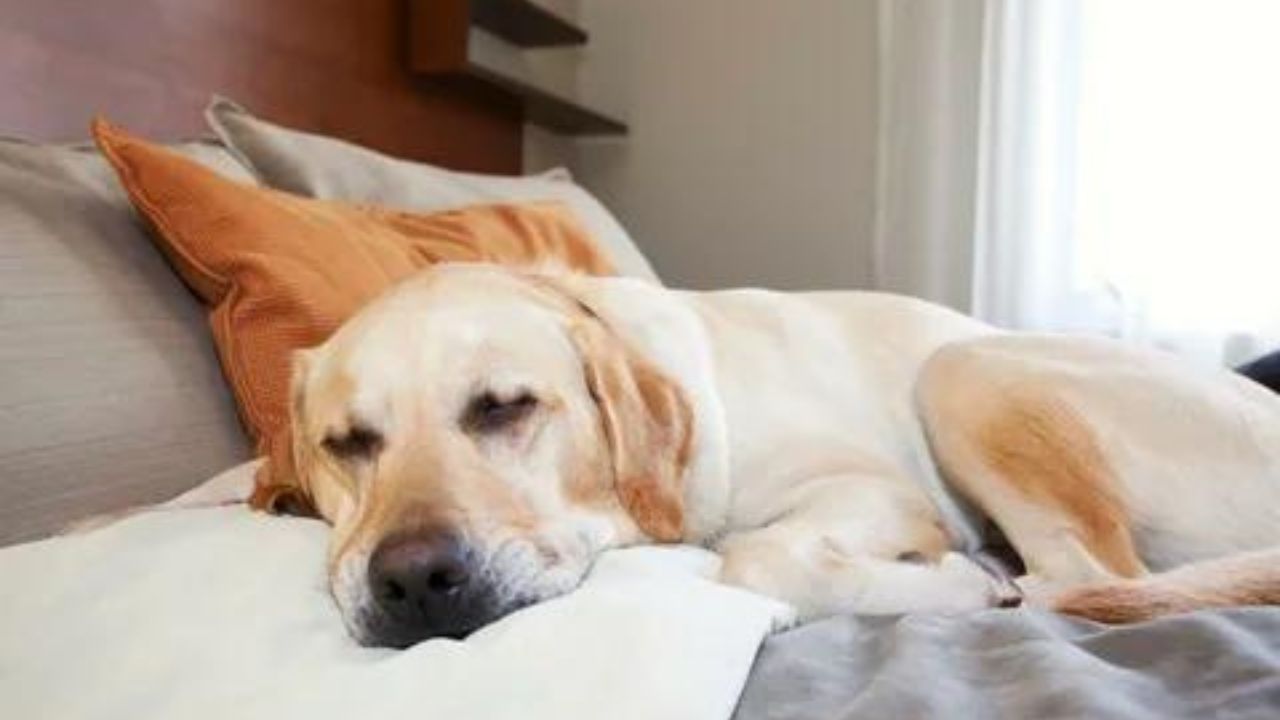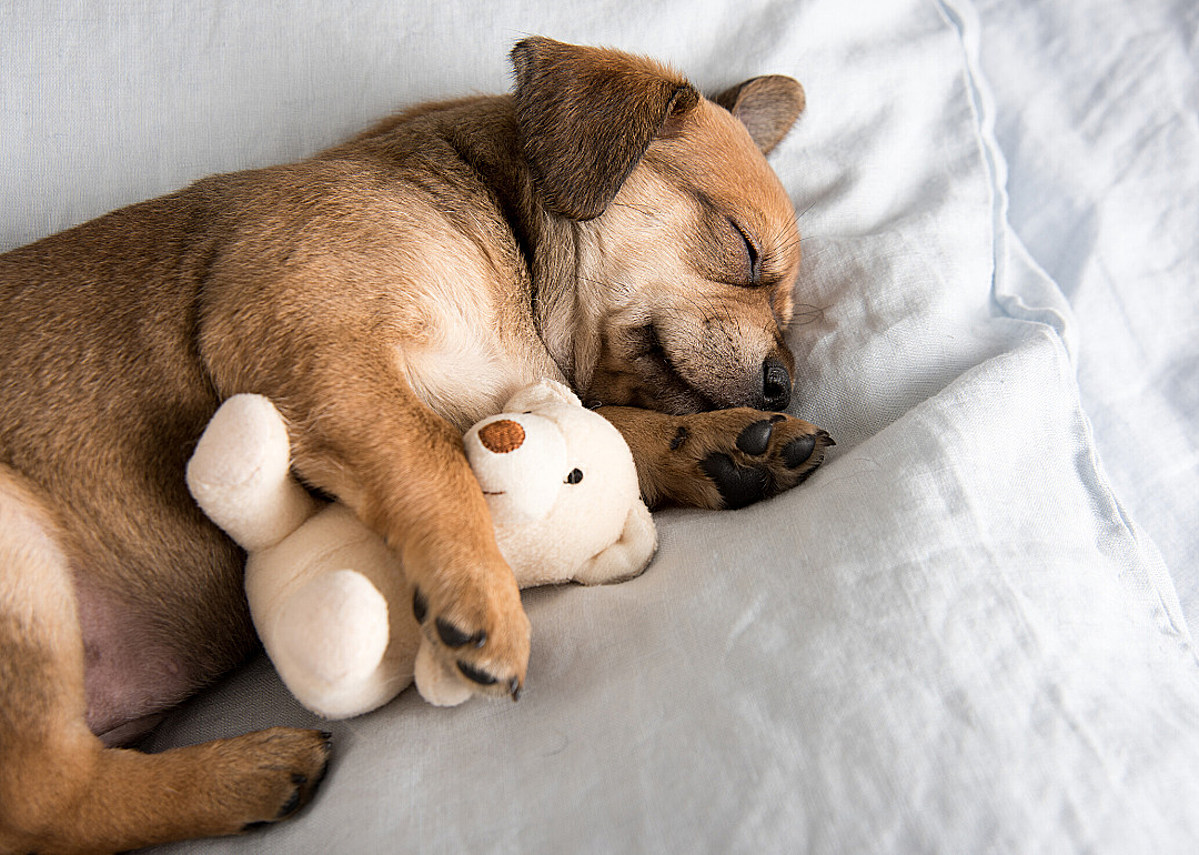
As a new puppy owner, you may have noticed that your furry friend seems to be sleeping a lot. But how much do puppies sleep need?
The average puppy needs between 12 and 14 hours of sleep per day, depending on their age, breed, and size. This may seem like a lot, but it is necessary for their developing bodies and minds.
During sleep, puppies undergo important growth and brain development, which sets the foundation for the rest of their lives. By understanding the importance of sleep for puppies, you can ensure that your furry friend gets the rest they need to grow and thrive.
In this article, we will dive into the world of puppy sleep and explore how much rest your puppy needs, the different stages of sleep, and how to ensure that your puppy gets the best night’s sleep possible.
How Much Sleep do Puppies Need?
As mentioned earlier, the average puppy needs between 14 and 17 hours of sleep daily. However, this number can vary depending on several factors, including age, breed, and activity level.
For example, younger puppies may need even more sleep, while older puppies may require slightly less. Small breeds typically need less sleep than larger breeds, and more active breeds may require more sleep to rest.
It’s also important to note that puppies will sleep more during the day and less at night as they age and adjust to a normal sleep schedule. This is why it’s important to establish a regular sleep routine for your puppy from an early age, as it will help them adjust to sleeping through the night more easily.
Puppies need a lot of sleep to grow, develop, and maintain their health, and pet owners should do their best to ensure their furry friends get enough rest.
By providing a comfortable sleeping environment, plenty of exercises, and a regular sleep routine, pet owners can help their puppies get the sleep they need to thrive.
How Much Sleep do Puppies Need by Age?
Puppies around 7-8 weeks old should sleep 18-20 hours every night, according to the AKC! Most puppies are weaned from their mothers and moved into new homes at this age. This regimen is followed up until the baby is 20 weeks old. The canines’ sleep duration decreases to 13–15 hours as they age.
Little puppies are, therefore, only awake for 4-6 hours. This period is broken up into numerous little intervals so the puppy can play, eat, and engage in other activities.
The Sleep Cycle of a Puppy
Just like humans, puppies go through different stages of sleep, each with its unique benefits. Understanding these stages can help pet owners ensure their puppies get the most out of their snooze time. The significant stages of puppy sleep are:
Light Sleep
The first stage of sleep is this, also known as non-REM sleep. During this stage, the puppy is still alert enough to be woken up easily and may twitch, move, or make noise. However, their body is still in a state of relaxation, and they’re getting some important physical and emotional benefits from this stage of sleep.
Deep Sleep
The second stage of sleep is deep sleep, also known as REM sleep. During this stage, the puppy is in a state of deep relaxation and is typically harder to wake up.
During this stage, the body is repairing and rejuvenating itself, and the brain is processing new information and forming memories. This stage of sleep is critical for brain development and is when the puppy gets the most rest and rejuvenation.
Dream Stage
During this stage, the puppy may start to move around and even bark or growl in their sleep as their brain is processing the day’s events and memories. This stage of sleep is also critical for emotional well-being, as it helps process and regulate emotions.
Sleep Patterns of Different Breeds of Puppies
Dogs are more than just our furry friends; they are a part of our family. As pet owners, it’s essential to understand their needs and habits, especially concerning sleep.
Different breeds of puppies have unique sleep patterns, and it’s crucial to understand these patterns to ensure they are getting enough rest and leading healthy life. Have you ever noticed that some puppies sleep all day while others are up and ready to play all night? It may come as a surprise, but this is not just a coincidence.
Different breeds of puppies have unique sleep patterns influenced by their size, energy level, and temperament. For example, smaller breeds like Chihuahuas and Pomeranians sleep more during the day and are more active at night.
On the other hand, larger breeds like Great Danes and St. Bernards tend to have longer sleep periods and prefer to rest for longer periods during the day.
Studies have shown that a well-rested puppy is happier, more active, and more alert during the day. A study by the National Sleep Foundation found that dogs who get adequate rest tend to live longer and have a lower risk of developing behavioral and health problems.
So, whether you’re the proud owner of a Chihuahua or a Great Dane, understanding the sleep patterns of your puppy can help ensure they live a happy and healthy life.
Differences Between Puppy Sleep and Adult Dog Sleep
We all know that dogs love their sleep. But have you ever stopped to consider that a puppy’s sleep patterns may differ from those of an adult dog?
As it turns out, there are some significant differences between puppy sleep and adult dog sleep, and understanding these differences can help pet owners ensure their furry friends get the rest they need to thrive.
For starters, puppies need more sleep than adult dogs. This is because their bodies are growing and developing rapidly, and they need more rest to support this growth. Additionally, puppies sleep more deeply and for shorter periods than adult dogs, as they need to be alert and ready to play at a moment’s notice.
On the other hand, adult dogs tend to sleep for longer periods, but their sleep is lighter and more fragmented. This is because they are less active than puppies and need less rest to support their growth.
However, adult dogs still require plenty of sleep to stay healthy and happy, and pet owners should ensure they provide their furry friends with a comfortable and safe sleeping environment.
How the Sleep Cycle Affects a Puppy’s Behaviour
A good night’s sleep can significantly affect our mood and energy levels. The same is true for our furry friends; a puppy’s sleep cycle can significantly impact its behavior and overall well-being.
During different sleep cycle stages, puppies experience various physical and mental processes that can affect their behavior. For example, during deep sleep, puppies are in a state of physical and emotional rejuvenation, which can help regulate their moods and reduce stress.
As opposed to that, during the dream stage, puppies may become more active and even bark or growl in their sleep as their brains process the day’s events and memories. In addition to the specific benefits of each stage of the sleep cycle, the quality and quantity of sleep a puppy gets can also impact their behavior.
If a puppy isn’t getting enough sleep, it may become irritable, hyperactive, or aggressive. On the other hand, if a puppy gets plenty of high-quality sleep, they’re likely to be more relaxed, happy, and well-behaved.
Tips for Ensuring a Good Night’s Sleep for your Puppy
As pet owners, we must understand the importance of a good night’s sleep for our furry friends. If you want to ensure your puppy sleeps well, Follow the tips below.
Provide a Comfortable Sleeping Environment: Make sure that your puppy has a comfortable bed to sleep in. This will help them feel safe and secure and encourage them to get a good night’s sleep. You can also use a soft blanket or a pillow to make your bed cozier.
Limit Stimuli Before Bedtime: Just like humans, puppies can have trouble falling asleep if overstimulated. To avoid this, limit the amount of playtime and exercise before bedtime. You can also keep the lights low and provide a calm and quiet environment to help your puppy relax and fall asleep.
Stick to a Routine: Creating a bedtime routine can help your puppy understand when it’s time to sleep. This could involve a calming activity like reading a book or listening to soft music, followed by a trip to the bathroom, and finally, settling in for the night.
Provide Plenty of Exercise During the Day: A tired puppy is happy. Providing your puppy with plenty of exercise and playtime during the day will help them fall asleep faster and stay asleep longer.
Avoid Disrupting their Sleep: Once your puppy has fallen asleep, try not to disturb them. This means avoiding loud noises, bright lights, and other stimuli that could wake them up.
These tips can help ensure your puppy gets the rest it needs to live a happy and healthy life. Remember, a well-rested puppy is a happy puppy, and a happy puppy is a joy to be around!
Conclusion
Understanding the sleep patterns of different breeds of puppies is crucial to ensuring they get the rest they need to live a happy and healthy life.
From providing a comfortable sleeping environment to sticking to a routine, you can do many simple things to help your furry friend get a good night’s sleep. So, let’s all do our part to help our puppies get the rest they deserve!








